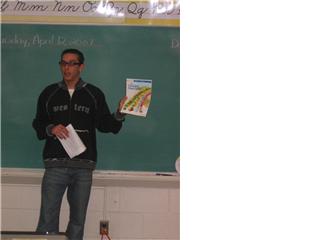 |
Western Track Star Promotes Healthy Lifestyle to Public School Students April 12, 2007 On April 12th Andrew Judge, an elite Western Track athlete and Philosophy major at King’s University College met with students at Tweedsmuir Public School to talk about healthy diets and active life styles. Judge is among 10 Western student athletes who were chosen to participate in Professor/Coach Craig Boydell’s senior Kinesiology Seminar; Sport and Community Service. During the term students create and carry out a variety of community outreach projects and events aimed at achieving some worthwhile objective. According to Judge, the need here is to find ways to address the concern that we are constantly hearing about to foster healthier life styles among children. Boydell echo’s these concerns. “To say this is an urgent need is an understatement in terms of everything we know about the implications of proper diet and exercise for general health and well being.” Tweedsmuir became a logical choice for a pilot project when Judged learned that his concerns were shared by Aiisha Huggins at teacher at the school who is also an assistant Coach on Western’s Track and Field team. Huggins had become increasingly concerned about the quality of food she was seeing consumed during lunch times and also the lack of information children had about and encouragement to become involved in active life styles. This connection was further enhanced by the fact that Judge had already become know to students in the school as the “the guy who can jump really really far” when the CIS National Medalist in the long jump and hurdles conducted a mini clinic at the school. In his multi-dimensional presentation Judge encouraged the students to get involved in extra curricular activity at their school and in their neighborhood. He also challenged them to make good choices when it came to their eating habits. “The response to Andrew’s presentation was enormous” Aiisha said. “He was already someone they looked up to because of his athletic exploits and throughout the presentation the children were engaged and participated with enthusiasm”. Judging from the comments she received from the students later, the examples he used, the personal experiences he related and the challenges he threw out to them really seemed to get their attention. “All the Children had a positive experience, they decided they would make a conscious effort to take the suggestions Judge had given and use them to their advantage”. The concern that gave rise to this pilot project extends well beyond any single school or community. It is endemic in society as a whole and the personal and social costs are high. While the causes may be deep routed and complex at least some of the solutions are not. Boydell notes that “we talked a lot in the course about how athletes can use their profile in the community to influence change in this and other areas. In addition to being fairly public images to many kids, the knowledge that elite athletes gain about exercise and diet through their own training programs makes them both experts as well as outstanding examples because they know they must walk the walk to succeed.” Judge couldn’t agree more. “I felt like it was easy to prepare my presentation to the kids at the school because it was what I have been living with my teammates and learning from my coaches and trainers for quite some time now. But it wasn’t until I saw how positively they responded that I really realized what an impact we can have. I couldn’t be more pleased about how this went and I think that this is an area in which student athletes can really contribute.” Boydell feels Western’s coaches and athletes have always done a lot in the community but that with a bit more structure and encouragement they could do even more. “Part of our mission in this course” he notes
|